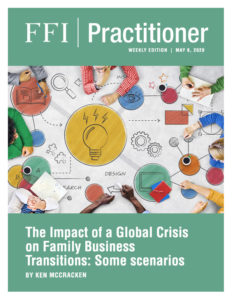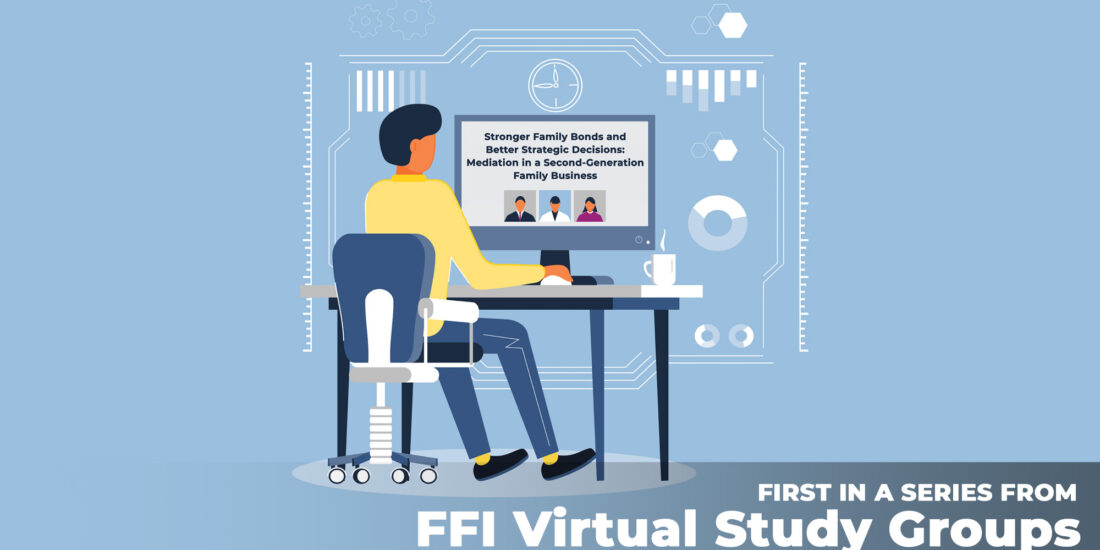
View this edition in our enhanced digital edition format with supporting visual insight and information.
Thanks to this week’s contributor, Ken McCracken, for his article exploring the impact of the Covid-19 pandemic on family business succession planning. In the article, Ken explains how biases, such as the, “That won’t happen to us” mentality can hinder a family’s succession planning process and provides advisors with practical questions to begin conversations with family business clients about how the pandemic may impact their plans for the future.
Step forward, anyone who modelled the impact of a global health pandemic on family business transitions, and take a bow. Now, hurry up and please share with us what happens next.
While waiting on this seer to emerge, it is worth starting a discussion among the rest of us who feel that the current state of our knowledge might be inadequate for the task.
We are biased
We cannot argue that nothing like Covid-19 has happened before. The Ebola epidemic that swept through West Africa between 2014 and 2016 resulted in more than 28,600 infections and 11,000 deaths. This illustrates, again, how our professional and personal lives are affected by biases.
The optimism bias is the tendency to think that negative events are more likely to happen to others. If we learn about a health crisis in another country we think, “It won’t happen here.” Even when our research or general knowledge has identified important facts and information, we may be biased in favour of ignoring them because of the disruption that will result from acceptance.
This bias can prompt some family businesses to delay planning for the inevitable change in ownership and leadership. When these families hear about disasters caused by delay in other businesses, they maintain a sense of control and self-esteem through the belief, “That won’t happen to us.”
These clients are immune to the dire predictions of advisors who seek to help by emphasizing the dire consequences of not adequately planning for the future. In this competition between optimists and doomsters, the optimists often prevail.
Advisors do not have herd immunity when it comes to biases. Our knowledge and experience enable us to remain reasonably objective in client interactions, but not entirely. To think otherwise is an example of bias blind-spot, where we are less likely to detect bias in ourselves than in others.
One hopes that by learning more about how biases affect family business consulting, both clients and advisors will become less ignorant, and we can collaborate towards the goal of alleviating the impact that bias has on our joint endeavours.
Lamentations
How long will it be until the current restrictions on individual freedom in many countries end? No one knows, but in the meantime, there are more traditional family business lamentations than bewailing the duration of the current lockdown.
How long, the seniors lament, will it take the next generation to make up their minds about having a role in the family business?
How long, the next generation retorts, will it take the seniors to decide when to retire?
Since neither generation wants to put the other under too much pressure, transitions can take a long time to unfold.
The practical question in the current crisis is “How long will it take a family business to recover from the Covid-19 fallout?” After answering that question, the next one is, “Who will be around to deal with these consequences?”
We could be living through an epochal change, and perhaps in future we will classify time as pre-CV and post-CV. After this virus ebbs, some people may want a return to their pre-CV life. Anyone who believes that this is likely, rather than just desirable, needs to do little more than wait patiently for normal life to resume.
Others will think that the world post-CV will be a very different place. Some of the changes may be immediately apparent, such as the increased use of video conferencing leading to a decline in discretionary business travel.
Other changes will take longer to emerge as society adjusts to coping with the consequences of the economic stimuli being used in many countries. This might lead to new wealth taxes if governments cannot replenish their nations’ coffers just by adjusting taxes on income or consumption.
Who knows? But choices still need to be made in times of uncertainty, so the question remains: which generation will be most involved and at risk when dealing with the post-CV era?
The obvious answer is the next generation, because the scale of societal change could take a while to emerge. In which case, it is helpful that the family business world has been awash with next gen programs. But maybe it is time for the next gen to spend less time attending courses and more time getting to grips with the future of their family business, whether that be in the role of leader or owner.
The seniors, meanwhile, need to adjust to the possibility that their era is being cut short. Maybe the challenge of helping them cope with this sudden transition will be addressed through education and networking. Those in the business of training may need to spend more time helping the senior generation cope with the unexpected dislocation in their lives, while the next gen grapple with the future.
Or is this view of transitions too simplistic?
Transitions and triggers
We are used to the role of triggers in the transition process—events that motivate a family to start succession planning. For example:
- Temporal triggers: the natural aging process that encourages action because “none of us is getting younger.”
- Family triggers: natural events that can motivate people to re-evaluate their lives, such as marriage, divorce, children, or an unexpected illness.
- Environmental triggers: changes in the external environment that either threaten the family business’s viability or offer new opportunities at the cost of making changes.
Covid-19 is a major environmental event, but will it trigger intergenerational transitions in many family businesses?
Triggers occur regularly in a family business, but many of them are either ignored or are absorbed, resulting in minor alterations to the existing order rather than radical change. Family businesses, we are told, prefer evolution to revolution. And why not? If the structures a family business has in place have underpinned their success so far, it makes sense to try to move forward by replicating the past.
This habit also means that transitions in a family business are gradual and unfold over time. Family business advisors learn that it is helpful to hurry slowly when facilitating change.
But Covid-19 is such a huge event, surely it will be a trigger for many family businesses to make the transition from one generation to the next?
That will not be the case among those who are profiting from a crisis (such as supermarkets and online retail), or among those who are in survival mode and feel that they have more than enough worries right now without starting a discussion about succession planning.
Other families might even be reversing partially-implemented succession plans, with retired family members either seizing the opportunity to return to front-line duties (to the immense frustration of their successors) or being welcomed back to help with their experience and energy.
A good way to start a conversation about the impact of Covid-19 on family business transitions is to ask the right questions. The following is no more than a start to this process:
- Will the Covid-19 crisis have such a psychological impact that it will change the biases that affect our work?
- Does the next generation need to take leadership soon as possible in order to cope with the long-term social and economic consequences of this pandemic?
- Do we need to develop support networks for the senior generations, whose role and status are being radically changed by current events?
- Will Covid-19 trigger transitions, or will families allocate their time and money to the tasks of either surviving or exploiting new opportunities?
About the Contributors

Ken McCracken, FFI Fellow, is a family business consultant and founder of MFBC Limited in Edinburgh, Scotland. Ken teaches a Family Business Module on the STEP Professional Postgraduate Diploma in Private Wealth Advising and in 2016, he was named the “Family Business Adviser of the Year” by the Society of Trusts and Estate Practitioners. He is a former member of the Research Applied Board for the Family Business Review and is a current member of the 2020-2021 UK/Europe Regional Advisory Committee. In 2018, Ken chaired the FFI Global Conference in London. Ken can be reached at ken@m-fbc.com.

View this edition in our enhanced digital edition format with supporting visual insight and information.





